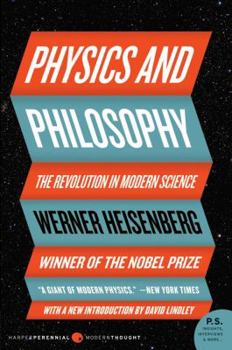Physics and Philosophy: The Revolution in Modern Science
Select Format
Select Condition 
Book Overview
The seminal work by one of the most important thinkers of the twentieth century, Physics and Philosophy is Werner Heisenberg's concise and accessible narrative of the revolution in modern physics, in which he played a towering role. The outgrowth of a celebrated lecture series, this book remains as relevant, provocative, and fascinating as when it was first published in 1958. A brilliant scientist whose ideas altered our perception of the universe,...
Format:Paperback
Language:English
ISBN:0061209198
ISBN13:9780061209192
Release Date:May 2007
Publisher:Harper Perennial
Length:256 Pages
Weight:0.42 lbs.
Dimensions:0.6" x 5.5" x 8.0"
Customer Reviews
5 ratings
Fascinating insights from a great physicist.
Published by Thriftbooks.com User , 15 years ago
This little book is highly recommended to anyone interested in the philosophical implications of the new paradigms of physics of the twentieth century, ...relativity and quantum theory. It is especially fascinating to hear first hand from, Werner Heisenberg, having been a key player in the development of quantum mechanics and the Copenhagen interpretation. Heisenberg, very nicely, presents a history of the development of physics, and philosophy as it relates to epistemology, in order to contrast such ideas with the strange reality of quantum theory. Ancient Philosophy, and especially modern philosophy since Rene Descartes, John Locke, David Hume, George Berkeley, culminating with Immanuel kant, ... has had a close relation with science in the analysis of scientific method indirectly through the study of the philosophy of knowledge, and here Heisenberg presents a wonderful overview. Kant's transcendental deduction, that a-priori cognitive faculties determine the form of experience, and so the conditions of science, is here presented by Heisenberg with his amended argument that such a-priori conditions "can have only a limited range of applicability", something "Kant couldn't have foreseen". Heisenberg implies that this is where Kant "went wrong" in his analysis. While its true that Kant's a-priori synthetic concepts of space, time, and causality, are inapt prior to the wave function collapse of quantum mechanics, and yet science is still able to make predictions about phenomenal reality, ... the fact is, no one 'understands' quantum mechanics apart from these conceptual forms!! That is after all the point of the Copenhagen interpretation, just do the math and never mind (visualize) what's going on in 'reality' in between observations. This is already the essence of Kant's argument, that reality as it is in-itself, noumenal reality, is unknowable in principal, apart from the a-priori conditions of understanding due to the nature of mind. It seems that Heisenberg's reinterpretation of Kant's philosophy is redundant, and unnecessary. In any event, this is a classic book which should be read by anyone interested in the modern physical sciences.
Just get it...
Published by Thriftbooks.com User , 16 years ago
If quantum mechanics and all of its philosophical implications tickles your fancy, BUY THIS BOOK! Heisenberg jumps off the pages with an eloquence long forgotten in our day.
Classic introduction to quantum reality and implications for Philosophy
Published by Thriftbooks.com User , 18 years ago
Since the 17th century, philosophers have been struggling with the implications science has for classical philosophical questions. In a way, the relationship between science and philosophy is one that has always occured in Western philosophy; Socrates, Plato, Aristotle, and also the medievals grappled with science and what relation it had to philosophy, but with the apparent triumph of science in the 20th century as mankind's premier way of knowledge, the questions are all the more urgent. While Heisenberg wrote this book seventy or so years ago, it remains a classic for two reasons. One, Heisenberg himself was one of the pioneers of quantum mechanics, and second, he is widely read in the Western philosophical tradition. He shows an excellent understanding of Aristotle and Kant, and proceeds to argue where he feels philosophers have it right, and wrong, in the light of science. Like many scientists he argues for a more process based approached to the world rather than seeing reality as a static and timeless entity, and that space is not really empty and that the microworld is different from the macroworld and is more a place of potentiality than actuality. This work remains a beautiful exploration of the relationship between two ways of exploring the world and is essential reading for philosophers and scientists alike.
Quantum mechanics and philosophical theories.
Published by Thriftbooks.com User , 22 years ago
This book is important because Heisenberg clearly explains why quantum mechanics was fatal for great philosophical theories, and more particularly, for logical positivism and Kant.Logical positivism affirms that all knowledge is ultimately founded in experience. This led to a postulate concerning the logical clarification of any statement about nature. But since quantum theory such a postulate cannot be fulfilled.Kant's a priori's like space and time are viewed totally differently since quantum theory. His law of causality is no longer true for the elementary particles, because we don't know the foregoing event accurately or this event cannot be found.Heisenberg states that it will never be possible by pure reason to arrive at some absolute truth.Naturally this book is not up to date. It doesn't speak about COBE or superstrings. But Heisenbergs explanation of quantum theory is second to none.Quotable. After someone said that the quantum theory may be proved false, Bohr answered: 'We may hope that it will later turn out that sometimes 2 x 2 = 5, for this would be of great advantage for our finances'.A great book.
A hidden treasure
Published by Thriftbooks.com User , 26 years ago
Heisenberg, the man who removed absolute destiny from science and replaced it with chance, eloquently attempts to unify the philosophies of Kant, Descartes, and Einstein with science in regards to the recent developments of Quantum Theory. From a historical and internal perspective, Heisenberg speaks directly to the the reader without the intellectual ego that often accompanies a man of his renowned stature.






